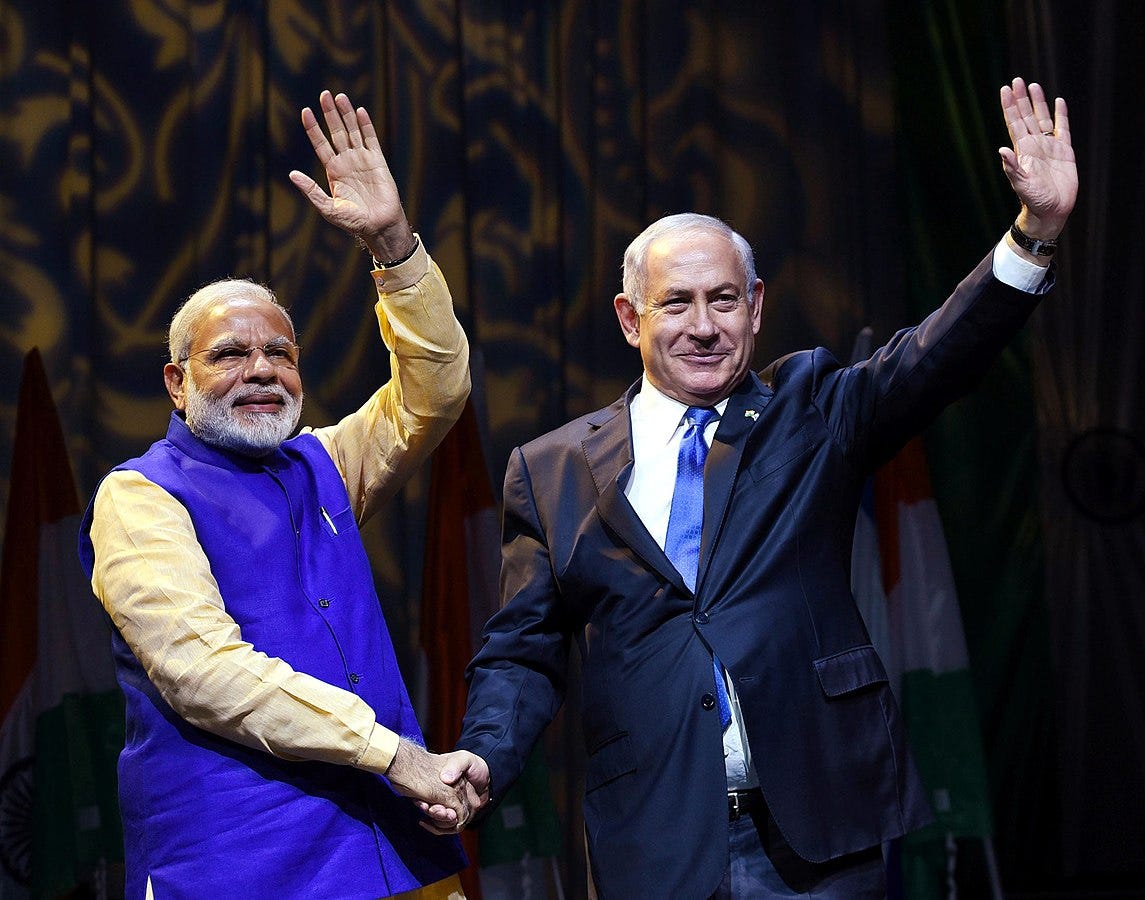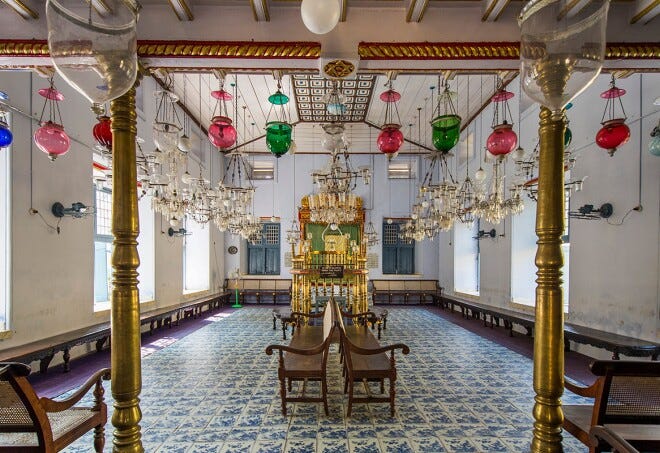A History of the Jewish Community in India: From Ancient Refugees to Modern Allies
From Ancient Roots to Modern Bonds: The Enduring Legacy of Jews in India and the Evolution of India-Israel Relations
The Jewish community in India has a rich and ancient history, tracing its origins back around 2,000 years. The first Jews are believed to have arrived in India possibly after the destruction of the Second Temple in Jerusalem, seeking refuge from persecution. They settled in the port city of Kochi, Kerala, a significant hub of the spice trade that attracted many settlers from different cultures due to its welcoming environment and thriving economy.
The Early Jewish Settlers and the Kingdom of Kerala
The earliest Jewish settlers are thought to have first arrived in Cranganore, a district in Kerala. These settlers found favor with the local ruler, Bhaskara Ravi I, who granted them privileges that helped them integrate into the local society. The Jewish community, known for their skills in military and financial matters, assisted the king during conflicts, earning their place in the kingdom. In recognition of their contributions, the Jewish community was honored with a copper plate, symbolizing their importance and acceptance in the region.

Despite the arrival of the British in 1795, the Jewish community in Malabar continued to thrive. Over the centuries, they transitioned from being agriculturalists and traders to becoming professionals such as lawyers, engineers, and teachers. The Jewish community's integration into Indian society was evident in their prosperity and peaceful existence, free from the persecution they had faced in other parts of the world.
In stark contrast to this history of harmony, modern Kerala has seen a shift in political sentiments. In recent years, major political parties in Kerala, including the Congress and Communist parties, have conducted rallies supporting Palestine and Hamas. These rallies gained international attention, even attracting the notice of a Hamas leader, marking a significant departure from the historical tolerance that characterized Kerala's relationship with its Jewish community.
Establishment of Synagogues and Cultural Legacy
The Jewish community in India established the first synagogue in the country in 1568. Among the many synagogues that were built, the Paradesi Synagogue in Kochi stands out as a notable historical landmark. Although it was destroyed by the Dutch in 1662, it was reconstructed.
Current Jewish Life in India
Today, the Jewish community in India is small but continues to maintain its cultural and religious traditions. It is estimated that there are around 5,000 Jews living in India, with the majority residing in the state of Maharashtra, particularly in Mumbai. This community, although diminished in size due to emigration to Israel and other countries, remains vibrant and active in preserving its heritage.
In a significant development, the state of Maharashtra, under the leadership of the BJP government, officially recognized Jews as a religious minority in 2016. This recognition was an important milestone for the Jewish community, as it acknowledged their unique cultural and religious identity within India's diverse society. The move was widely appreciated by the community, as it provided them with greater visibility and support within the Indian legal and social framework.
Despite the small numbers, Jewish life in India continues to thrive, with synagogues, community centers, and cultural events playing a central role in keeping the community's traditions alive. The Jews of India continue to contribute to the rich tapestry of Indian society, while also maintaining strong ties with their historical roots and the global Jewish community.
Unlike in many other countries, where Jews faced persecution and were often forced to flee or live in ghettos, the Jewish community in India enjoyed a peaceful and prosperous existence. This is particularly remarkable considering the long history of Jewish persecution in countries such as Spain, Germany, and Russia, among others. India stands out as one of the few countries where the Jewish community never faced persecution, finding instead a safe and welcoming home.
Unlike certain other immigrant groups, the Jews were never problematic; they always adapted to and respected Indian culture, contributing positively to the society in which they lived.
India-Israel Relations: A Complex Journey
As the Jewish community in India continued to flourish, the global geopolitical landscape was changing. After the establishment of Israel in 1948, many Jews from India emigrated to the newly founded Jewish state. However, the relationship between India and Israel was initially complex.
India, under its first Prime Minister Jawaharlal Nehru, voted against the United Nations General Assembly's resolution on the partition of Palestine on November 29, 1947. Nehru's stance was influenced by both moral and geopolitical considerations. On moral grounds, he followed the principles of Mahatma Gandhi, who believed that the Jews had made a grave mistake in seeking to establish themselves in Palestine with the support of Western powers. Gandhi argued that Palestine belonged to the Arabs, just as England belonged to the English, and France to the French, as he articulated in an article in Harijan in November 1938.
Despite these early tensions, India formally recognized Israel in 1950, and Israel opened a consulate in Bombay in 1953. Over the years, collaboration between the two nations slowly increased, particularly as Israel became a key ally to India amidst its conflict with Pakistan. However, during the years of Congress rule, India-Israel relations were often constrained due to the minority appeasement politics practiced by the Congress government, despite Israel's willingness to strengthen ties.
The first official correspondence between India and Israel took place in 1962, during the Sino-Indian War. Prime Minister Jawaharlal Nehru reached out to Israeli Prime Minister David Ben-Gurion, seeking assistance in the form of arms and ammunition. However, Nehru stipulated that the shipments should not bear the Israeli flag to avoid straining India's relations with Arab nations. Ben-Gurion, while sympathetic to India's situation, declined to provide aid under these conditions. It was only when India agreed to accept shipments bearing the Israeli flag that Israel began to engage with India at a strategic level.
India again sought Israel's help during the 1971 war with Pakistan. Historian Srinath Raghavan notes that Despite Israel facing its own arms shortage and the U.S. supporting Pakistan, Israeli Prime Minister Golda Meir rerouted a shipment intended for Iran to India. However, she requested that India establish diplomatic ties in return for the arms. Despite Israel's crucial support, Indira Gandhi's government remained a staunch supporter of the Palestinian cause, consistently backing the Palestinians' right to self-determination and condemning Israeli occupation.
In 1974, India officially recognized the Palestine Liberation Organisation (PLO) under Yasser Arafat as the sole and legitimate representative of the Palestinian people. Arafat shared close ties with Indira Gandhi, referring to her as "my sister." His multiple visits to India during her tenure helped strengthen the political and diplomatic ties between India and the Palestinian leadership. In 1975, India allowed the PLO to open an office in New Delhi, further solidifying their relationship.
A Strengthened Alliance Post-1990
The relationship between India and Israel began to strengthen significantly after the 1990s, especially with the establishment of full diplomatic relations in 1992, when India opened an embassy in Tel Aviv, and Israel opened one in New Delhi. This marked the beginning of a new era of cooperation and mutual support between the two nations.
Israel played a crucial role in assisting India during the Kargil War in 1999 against Pakistan, even in the face of international pressure from countries like the United States. This support further solidified the bond between the two nations.

The relationship between India and Israel reached new heights in 2017 when Narendra Modi became the first Indian Prime Minister to visit Israel. This visit symbolized the growing closeness between the two countries, which continue to collaborate on various fronts, including defense, technology, agriculture, and trade.
During recent Israel-Palestine conflicts, Indian govt publicly condemned the pogrom conducted by Palestinians against Jews on October 7,2023. During the conflict, India secretly exported arms to Israel. While maintaining a strategic partnership with Israel, India has also provided humanitarian assistance to the Palestinian people, reflecting its historically balanced approach to the conflict.
Conclusion
The story of the Jewish community in India is one of resilience, prosperity, and integration. From their arrival in Kerala 2,000 years ago to their contributions to Indian society, the Jews of India have left an indelible mark on the country's history. Furthermore, the evolution of India-Israel relations reflects a journey from cautious diplomacy to a strong and enduring partnership. As both nations continue to collaborate, the legacy of the Jewish community in India serves as a reminder of the enduring bonds of history and shared values.



I'm the son of an immigrant Jew from Mumbai. I always thought it fanciful there were Jews in India but then I learned about the Bene Jews and everything fell into place for me. I'm proud of my Indian Jewish heritage! Thanks for providing more background.